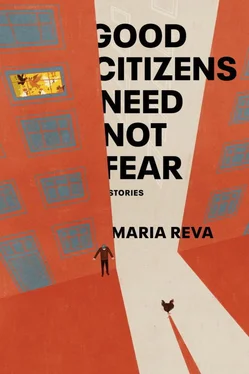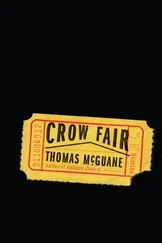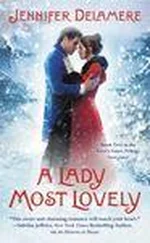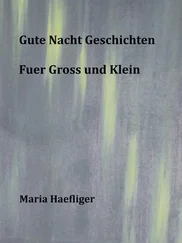
For a moment Konstantyn stands there, blinking, a dripping wooden spoon in hand.
He doesn’t look at her with fear, as the clients did, but regards her with simple recognition. She feels herself shrinking, suddenly powerless, but also—with relief—less monstrous.
“Just in time for lunch,” Konstantyn announces. His eyes flit over her billowy white dress but, mercifully, he doesn’t ask questions. He steps aside to let her in, as if she’s just returned from a stroll, as if he’d been expecting her.
The smell of the apartment greets her, unchanged. Old books, laurel leaves. A pot of soup bubbles on the stove, infusing the air with a sharp sweetness, like the underbelly of a rotting log. Zaya can’t recall the last time she ate.
“Mushroom soup,” he exclaims, as though nothing could make him happier. He gestures to a chair at the kitchen table.
The fact that the apartment hangs above an abyss becomes a distant worry.
The soup is salty but delicious, globs of oil shimmering over fungal caps and gills. She remembers not to scoop her spoon too deep, where the peppercorns hide. As she devours two bowlfuls with three slices of rye bread, uncertain if she’ll be invited to stay for another meal, Konstantyn chatters away. The other tenants having evacuated, he’s never lived in such quiet, he tells her. He thought he’d enjoy it, but at night he can hear his own pulse, like the drum of an approaching army. A few tenants moved to their dachas, others moved in with relatives many towns over. His ex-wife, whom he hopes Zaya might one day meet, left for Poland with her new family—he pauses at this last word, a seemingly difficult verdict.
“What happened to the saint?” Zaya asks. She wants to keep him talking as she reaches for more bread.
Observing how Konstantyn’s face darkens, she senses that his chatter has been an effort to avoid the subject.
“I’m so sorry. The saint is gone,” he says at last. “But at least it wasn’t crushed under the rubble.” A few days before the tomb caved in, Konstantyn discovered that the guard had sold the saint. When he demanded the saint’s return, the guard told him it would be impossible, the saint could be anywhere. “Actually, everywhere, ” Konstantyn corrects himself. “It had been split into many pieces.”
Zaya smiles at this thought, imagines the saint scattered all over the Earth, ever present. Satiated at last, she slips her half-eaten piece of bread into a pocket for later. “Why didn’t you leave like the others?” she asks. “Go to your dacha?”
“I’ve been busy.” His face erupts in a grin. “Home renovation. I’ve squeezed in a second room,” he says. “Yours.”
Konstantyn nods at a cherrywood door off the corridor. Zaya doesn’t remember it being there before. He springs to his feet, beckons her over, opens it. They stand at the threshold.
In the years to come, Zaya will reminisce about this room. It’s truly beautiful, everything she hadn’t dared dream of as a child, and it will stretch larger and larger in her mind, hold more windows. She’ll remember the telescope, the easel. The bronze gilded wallpaper and the painted sun shining from the ceiling, its rays twirling ribbons. The books, spines uncracked, take up an entire wall of shelves. Most of all she’ll remember Konstantyn, beaming at her. “Welcome home.”
She won’t know, won’t want to know, which of these remembered details are real.
She gets only a glimpse of her new room before its glossy hardwood floor gives out.
The furniture folds into the center of the room and vanishes, like a pop-up card closing.
One of the walls falls away, pulling a chunk of ceiling along with it. Zaya watches books flutter ten stories down, like a dole of doves.
For a second she thinks she could stay here until the entire apartment succumbs, but her body instinctively snaps into action. She grabs Konstantyn’s hand and pulls him back through the corridor. Light floods in as the walls and the rest of the ceiling crumble behind them. They race down the staircase two steps at a time, terrified of tripping, more terrified of slowing down. At last they’re outside, across the road.

Konstantyn doubles over, panting. A deafening crack, and the two halves of the building tumble into each other like lovers reunited, then collapse. A great plume of dust envelops them.
------------------
With each passing year Zaya thinks, Perhaps just one more year? The place isn’t so bad, after all. The Church has restored the cupolas, sealed the scratches in the frescoes and repainted them. Zaya keeps the sanitarka room, and Konstantyn sleeps in the sun-warmed attic. It was his idea to lease the monastery to the Church, after he and Zaya ate through the sea cabbage and squeezed flat the last tube of liver paste.
After 1933 Ivansk collapsed, Zaya had returned to the monastery with Konstantyn riding in the van’s passenger seat. They found the place deserted, the orphans and clients gone. The orphans must have pulled the screaming clients out of the hole—not just a hole to the orphans, but a grave yawning open. The only things left behind were the papers attesting to Zaya’s ownership of the property, thrown onto her bed. Zaya had imagined Almaza casting a last wary gaze over the lush grounds, their beauty having revealed a shameful secret.
Now Zaya wanders the meadows, watching the bustling monks as they hike up their robes to pull weeds. They try to fill in all the pits, but the property is large, and it isn’t unusual to stumble upon yet another unfilled hole. They’ve torn down that old fence, and soon will build an even taller, sturdier one. For security. The forest is full of beasts, the monks say. We’ve got to keep them out.
My deepest gratitude to those who helped bring this book into the world: Amelia (Molly) Atlas, agent extraordinaire and short-story advocate. Everyone at Doubleday, especially Lee Boudreaux for her unifying vision for this book, as well as Alessandro Gottardo (aka Shout) and Emily Mahon for the cover. At Knopf Canada, Lynn Henry for her wisdom and willingness to dive into the weeds of the sentences with me, and Rick Meier, who played a key role when the book was on submission. Heartfelt thanks to Sarah Savitt and Donna Coonan at Virago Books.
I owe a debt of gratitude to the Michener Center for Writers for giving me the time, resources, and mentorship to write this book. Special thanks to Elizabeth McCracken, Deb Olin Unferth, Jim Magnuson, Steven Dietz, Edward Carey, Bret Anthony Johnston, Michael Adams, Ben Fountain, Marla Akin, Debbie Dewees, Billy Fatzinger, and Holly Doyel. Thank you, Lara Prescott, Olga Vilkotskaya, Jessica Topacio Long, Nouri Zarrugh, Veronica Martin—invaluable classmates and friends. Thanks as well to Zoey Leigh Peterson and Julie Wernersbach, and to benefactors from the underworld: James A. Michener and E. L. Keene.
The writing community of Vancouver, especially Renée Sarojini Saklikar, whose mentorship came at a crucial time, and Isaac Yuen, for his friendship and exquisite prose. The Writers’ Trust of Canada and RBC Bank, for the generous support. Adam Day at the Baltic Writing Residency, where the “Lucky Toss” story unlocked itself at last.
The editors and journals who first published these stories: C. Michael Curtis at The Atlantic, Claire Boyle at McSweeney’s, Rosalind Porter at Granta.
Читать дальше














